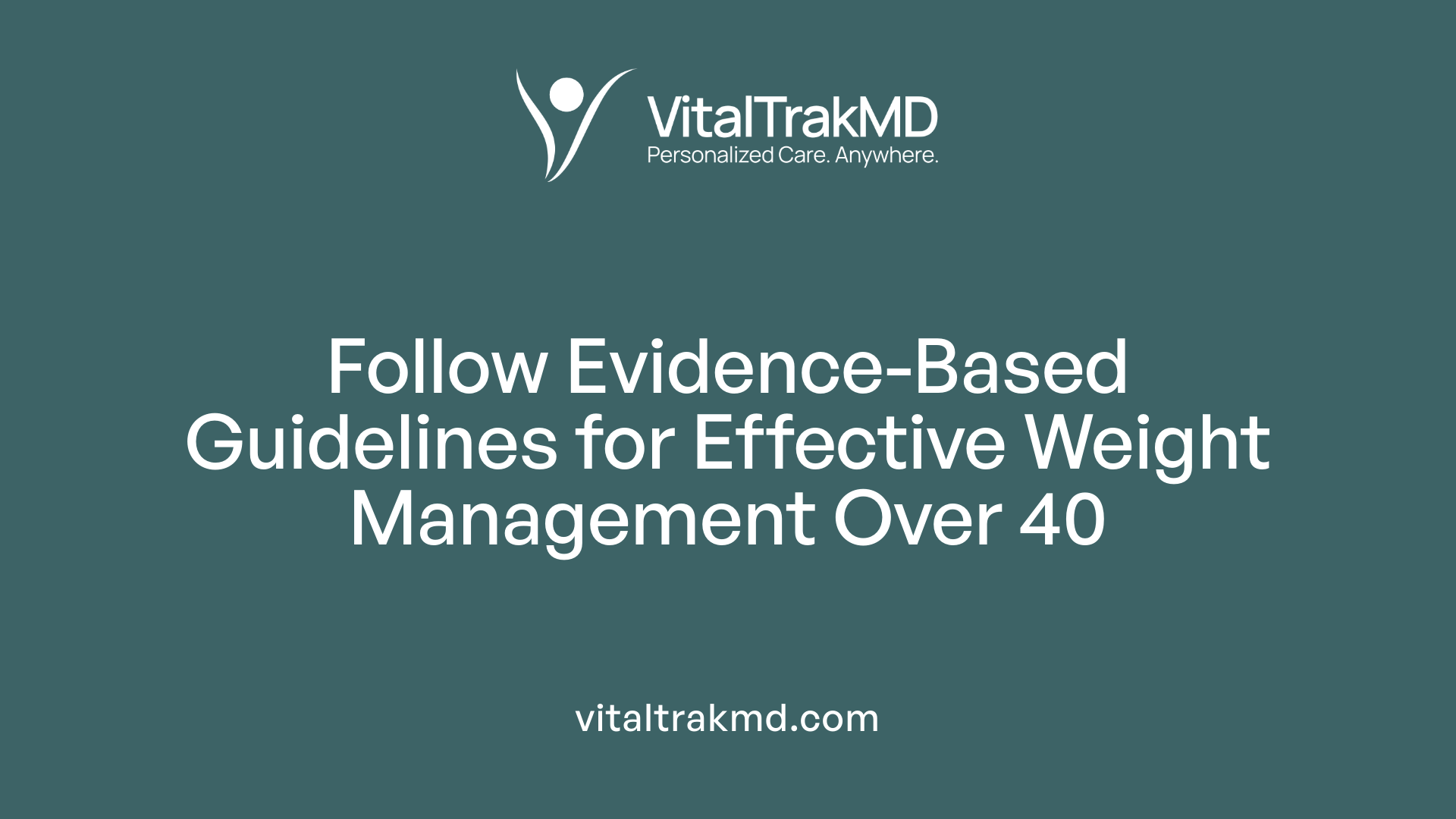Hybrid Weight Loss Programs Tailored Specifically for Adults 40+

Understanding Hybrid Weight Loss Strategies for the 40+ Demographic
With the unique physiological, psychological, and social challenges faced by adults over 40, effective weight management requires tailored approaches that combine the best of traditional and modern modalities. Hybrid weight loss programs, integrating face-to-face support with digital health tools, have gained prominence due to their promising outcomes in promoting sustainable weight loss and health improvements.
Characteristics and Core Features of Hybrid Weight Loss Programs for Adults Over 40
What are the key characteristics and features of hybrid weight loss programs designed for adults over 40?
Hybrid weight loss programs tailored for adults over 40 often blend digital health tools with personalized support to maximize engagement and results. These programs integrate elements like self-monitoring through mobile apps or web platforms, where participants track their food intake, physical activity, and weight.
Goal setting is personalized and adaptable, helping individuals create realistic targets based on their health status and lifestyle. Behavioral change principles such as motivation, goal-setting, and handling setbacks are central, often guided by theories like social cognitive theory.
Social support plays a vital role, with many programs offering features like support groups, coaching, or counseling, either virtually or face-to-face. Such interactions encourage accountability and provide encouragement.
The digital components include eHealth tools such as websites, mobile apps, and SMS messaging, which provide educational resources, reminders, and feedback. Some programs employ telehealth consultations with healthcare professionals to add a layer of personal guidance.
Cultural relevance and local adaptation can help improve participation, especially in diverse populations. The combination of technology and human support creates a comprehensive experience that fosters sustained engagement and effective weight management.
Studies highlight that these hybrid strategies often lead to greater weight loss, with reductions ranging from approximately 3.9 to 8.2 kg, and improvements in related health markers like BMI and waist circumference. Overall, these programs leverage the strengths of both digital innovation and personal interaction to promote healthier lifestyles among adults over 40.
Effectiveness of Tailored Weight Management Strategies in Adults Aged 40+
What is the structure and outcome of weight management programs for adults over 40?
Many current programs for adults aged 40 and above focus on personalized, multidisciplinary approaches. These involve a combination of dietary modifications, increased physical activity, behavioral support, and sometimes medical or technological interventions. For example, programs like the U-M Health Weight Management Program combine diet plans, exercise routines, and behavioral coaching. They typically last from several months to two years, with frequent assessments to track progress.
Outcomes of these structured programs are encouraging. Most report significant reductions in body weight, BMI, and waist circumference. The integration of tailored plans and ongoing support helps participants achieve sustainable lifestyle changes, which are crucial for managing weight and preventing related health issues.
How much weight do adults typically lose in these programs?
Weight loss results vary depending on the duration and intensity of the intervention. Short-term programs lasting less than 13 weeks tend to produce an average weight reduction of about -2.70 kg. Longer interventions spanning 13 to 26 weeks usually lead to slightly lower results around -2.40 kg. However, with more intensive, tailored, and multidisciplinary approaches, many adults achieve weight reductions of 5-10%, which can translate to 3.9 to 8.2 kg.
Moreover, medications like retatrutide have shown promising results, with some participants losing over 20% of their initial body weight over nearly a year, alongside improvements in metabolic health.
Are long-term outcomes better than short-term results?
While short-term interventions can be effective initially, maintaining weight loss remains challenging. Programs like the Mayo Clinic Diet or high-intensity behavioral interventions have demonstrated sustained benefits when healthy habits are embedded into daily routines.
Studies indicate that interventions lasting longer than six months, especially those with ongoing support, tend to promote better long-term maintenance. Yet, short-term, accessible programs often attract more participants, providing a valuable entry point for lifestyle change.
What health benefits can be expected?
Beyond weight loss, these approaches often lead to improvements in related health risks. Participants often see reductions in blood pressure, blood sugar, triglycerides, and improvements in insulin sensitivity.
Such benefits can decrease the risk of developing or worsening chronic conditions like type 2 diabetes, cardiovascular disease, and certain cancers. For adults over 40, these health gains are especially significant, contributing to increased longevity and better quality of life.
| Program Type | Duration | Average Weight Loss | Additional Health Benefits |
|---|---|---|---|
| Short-term (<13 weeks) | 3-12 weeks | ~2.70 kg | Reduced disease risk factors; improved metabolic health |
| Longer, structured programs (6+ months) | 6-24 months | 5-10% of body weight | Better long-term weight maintenance; decreased hypertension and dyslipidemia |
| Pharmacotherapy (e.g., retatrutide) | 48 weeks | Up to 24.2% weight loss | Significant metabolic improvements, including blood glucose and lipid profiles |
These results show that tailored, evidence-based strategies are effective for adults over 40, especially when combining behavioral, medical, and technological components tailored to individual needs.
Design Components of Age-Specific Weight Loss Interventions

What components and design elements are important in age-specific weight loss interventions for middle-aged and older adults?
Effective weight loss programs tailored for middle-aged and older adults need to incorporate a range of components that address their unique developmental and health needs. One fundamental aspect is the use of multicomponent approaches. These combine nutrition guidance, physical activity, and behavioral strategies to create a comprehensive intervention. For example, programs might include personalized diet plans, encouragement of regular physical activity such as walking or strength training, and behavioral support like goal setting and stress management.
Personalization plays a critical role. Interventions should be tailored to each individual’s health status, functional capacity, and comorbidities. For older adults, adapting the content to manage conditions like arthritis, cardiovascular disease, or diabetes ensures the program remains relevant and safe. Personalized counseling, whether face-to-face or using digital tools, helps increase engagement and ensures adherence.
Technology integration is increasingly important. Using internet platforms, mobile apps, and telehealth can make interventions more accessible and versatile. These tools provide continuous support, track progress, and facilitate remote consultations, which is especially beneficial for older adults with mobility challenges or those living in remote areas.
Motivation strategies are also essential. Approaches rooted in behavioral science, such as self-determination theory or behavioral economics, can help foster intrinsic motivation and sustain effort. Reinforcing small successes, providing social support, and creating enjoyable activity options boost adherence.
Furthermore, designing short-term, flexible interventions enhances participation rates among older populations. Programs that are accessible in terms of duration and intensity enable sustained engagement, leading to better long-term outcomes.
In summary, age-specific weight loss interventions should ethically blend multicomponent strategies, personalized content, technological support, and motivational techniques to effectively address the unique needs of middle-aged and older adults.
Scientific Evidence Supporting Hybrid and Customized Programs
Research into hybrid weight management interventions shows promising results for adults over 40. These programs typically combine face-to-face sessions with digital tools such as telehealth, email, or mobile health (mHealth) apps. Studies from the United States, Europe, and Australia have demonstrated that such integrated approaches effectively promote weight loss and health improvements.
Outcome measures used in these studies include reductions in body mass index (BMI), waist circumference, and improvements in physical activity levels. These interventions often result in weight loss ranging from about 3.9 to 8.2 kilograms, along with beneficial changes in cardiometabolic risk factors such as blood pressure, blood glucose, and lipid profiles.
One prominent example is the U-M Health Weight Management Program, a multidisciplinary, personalized lifestyle intervention that combines dietary plans, physical activity, behavioral support, and medical guidance. Such programs, including the use of meal replacements and gradual increases in activity, have shown success over two years in promoting sustained health improvements.
Short-term interventions lasting less than 13 weeks also show significant benefits, with an average weight loss of approximately 2.7 kilograms. These shorter programs are often more accessible and can be equally effective in reducing risks of chronic conditions like type 2 diabetes and cardiovascular disease.
Furthermore, hybrid models that incorporate educational resources, support groups, and digital coaching have demonstrated the ability to engage adults who might not participate in long-term programs. This flexibility is especially important for those over 40 who may have chronic health issues or limited time.
In addition to behavioral approaches, pharmacologic treatments such as retatrutide have shown remarkable efficacy in weight reduction, with some participants losing 20% or more of their baseline weight, further supporting the importance of personalized, combined strategies.
Overall, scientific evidence indicates that customized, hybrid interventions tailored to individual needs and health status are effective in promoting weight loss and improving health for adults over 40. These approaches leverage the strengths of both in-person guidance and digital support, making them versatile and accessible options for weight management.
Guidelines and Recommendations for Weight Management in Adults 40+

What are current clinical guidelines and evidence-based recommendations for weight management in adults over 40?
Managing weight effectively in adults over 40 requires a tailored, multi-faceted strategy grounded in current clinical evidence. Major health organizations such as the American College of Cardiology, the American Heart Association, The Obesity Society, and the European Society of Cardiology emphasize the importance of a comprehensive approach. This includes personalized lifestyle modifications, such as calorie-controlled diets, increased physical activity, and behavioral support.
One core goal across these guidelines is achieving a weight loss of at least 5%, which has been shown to improve cardiovascular health, reduce blood pressure, and help manage conditions like type 2 diabetes and sleep apnea. For most adults in this age group, engaging in at least 150 minutes of moderate-intensity aerobic activity weekly is recommended, complemented by muscle-strengthening exercises.
Evidence also supports the role of pharmacotherapy for weight management in individuals with a BMI of 30 or higher, or those with a BMI of 27 or more who have obesity-related health issues. Medications such as semaglutide and liraglutide have been approved to assist with sustained weight loss.
In severe cases, bariatric surgery is considered, especially for patients with higher BMI thresholds or significant comorbidities if lifestyle and medication interventions prove insufficient.
Special considerations for older adults include maintaining muscle mass and nutrient intake, addressing the obesity paradox, and focusing on overall health and mobility.
Overall, the guidelines advocate for continuous, evidence-based, multidisciplinary interventions and routine screening to identify appropriate treatment options. Individualized plans should aim at sustainable weight loss, improved metabolic health, and minimized health risks, recognizing that effectiveness depends on adherence and personalized care.
For further detailed information, searching "clinical guidelines weight management adults over 40" provides comprehensive and updated protocols from reputable health authorities.
Integrating Hybrid Programs into Primary Care Settings
How can hybrid weight loss programs be integrated into primary care for adults over 40?
Hybrid weight management interventions, which blend face-to-face counseling with digital health tools, are increasingly being adopted in primary care for adults over 40. These programs typically start with initial in-person sessions involving medical assessment, personalized diet and activity plans, and behavioral support. Afterward, patients receive ongoing digital support through telehealth visits, mobile health (mHealth) apps, or automated online platforms that promote self-monitoring and motivation.
This approach ensures continuous engagement without overwhelming healthcare resources, making it practical to embed within routine primary care workflows. Providers can connect their patients to digital resources through motivational interviewing and personalized follow-up, encouraging consistent participation and adherence.
Implementation strategies include training staff to facilitate digital engagement, integrating digital tools into electronic health records, and fostering collaboration between clinicians and digital platform providers. These steps help physicians monitor progress and adjust plans as needed, all while supporting patients in their weight loss journey.
Scalability is a significant advantage of hybrid programs. By leveraging existing telehealth infrastructure and digital platforms, practices can expand access to more patients without the need for extensive additional resources. The flexibility of these programs makes them suitable for diverse populations, especially in countries like the US, Europe, and Australia, where healthcare systems support technology integration.
Provider engagement is crucial for success. Healthcare professionals often see the value of hybrid interventions in improving patient outcomes and enhancing routine care. Training and ongoing support for providers help them feel confident in recommending and managing these programs.
Overall, the integration of hybrid weight management strategies into primary care holds promise for enhancing weight loss efforts among adults over 40, with evidence supporting increased adherence, personalized support, and scalable solutions that meet the demands of busy clinical settings.
Behavioral and Psychological Strategies for Adults Over 40
What behavioral and psychological approaches are effective for weight loss in adults aged 40 and above?
For adults over 40, addressing mental health and psychological factors plays a vital role in successful weight management. Evidence suggests that approaches like cognitive-behavioral therapy (CBT) and motivational interviewing are particularly effective.
CBT helps individuals recognize and change negative thought patterns related to eating, body image, and motivation. This therapy can reduce emotional eating and foster healthier behavioral habits. Motivational interviewing, on the other hand, encourages individuals to find personal reasons for change and boosts their commitment to weight loss goals.
Integrating psychological assessments into multidisciplinary programs ensures that emotional and mental health issues are addressed alongside physical health. Conditions such as depression, anxiety, and trauma often influence eating behaviors and can hinder progress if left untreated.
Promoting a non-dieting, acceptance-based approach helps reduce the stress and guilt often associated with dieting. Support systems like groups and social networks provide encouragement, accountability, and shared experiences, which can be motivating.
Stress management techniques, including mindfulness and relaxation exercises, assist in reducing emotional triggers that lead to overeating. Behavioral strategies such as setting realistic goals, self-monitoring weight and food intake, and rewarding progress support sustained behavioral change.
Overall, delivering tailored psychological interventions through trained professionals enhances adherence and outcomes. Combining these strategies with physical activity and nutritional counseling creates a comprehensive approach, addressing both mental health and physical well-being for adults over 40.
Nutritional and Lifestyle Modifications for Over 40s

What nutritional and lifestyle modifications are suitable for adults over 40 seeking weight loss?
For adults over 40 aiming to lose weight, adopting a balanced approach to diet and physical activity is essential. Nutrition-wise, focusing on eating a variety of nutrient-dense foods can promote health and support weight management. This includes consuming plenty of fruits, vegetables, whole grains, lean proteins such as poultry and fish, and healthy fats found in nuts, seeds, and olive oil.
At the same time, reducing intake of added sugars, saturated fats, salt, and refined grains helps prevent age-related metabolic issues. Incorporating these changes into daily routines can make a significant difference.
Physical activity also plays a vital role. Experts recommend at least 150 minutes of moderate aerobic activity per week, such as brisk walking or cycling. Strength training exercises twice a week help maintain muscle mass, which naturally declines with age and supports metabolic health.
Beyond diet and exercise, other healthy behaviors contribute to weight loss and overall wellbeing. Prioritizing 7-9 hours of quality sleep helps regulate hormones linked to hunger. Managing stress through mindfulness practices, yoga, or meditation can reduce emotional eating.
Staying physically active throughout the day—like using stairs instead of elevators or standing during work—enhances total activity levels. Regular health check-ups ensure early detection and management of health conditions that may impede weight loss.
Avoiding smoking and limiting alcohol consumption also support healthy aging. Combining these nutritional and lifestyle modifications creates a sustainable path toward maintaining a healthy weight and improving overall health for adults over 40.
Pharmacological and Medical Interventions for the Over 40 Age Group

What medical and pharmacological options are available for weight management in middle-aged and older adults?
For adults over 40, various medical and pharmacological approaches are used to manage weight effectively. These interventions often complement lifestyle changes and are tailored to individual health profiles.
Several FDA-approved medications are available, each working through different mechanisms such as appetite suppression, fat absorption reduction, or hormonal regulation to promote feelings of satiety. Notable options include orlistat, which decreases fat absorption; phentermine-topiramate, which suppresses appetite and enhances satiety; and bupropion-naltrexone, which influences brain pathways involved in hunger and mood.
Recently developed drugs like liraglutide 3.0 mg, semaglutide 2.4 mg, and tirzepatide have demonstrated remarkable efficacy in clinical trials. These medications often lead to significant weight loss, frequently ranging from 8% to over 20% of initial weight, particularly with semaglutide and tirzepatide showing the most pronounced effects.
Pharmacotherapy for obesity is most effective when combined with other lifestyle interventions such as diet modifications, increased physical activity, and behavioral therapy. While these medications can cause notable weight reduction, they are typically part of a comprehensive, individualized treatment plan.
For severe cases of obesity or when other treatments fail, bariatric surgery remains a highly effective option. Surgical interventions can result in weight loss of 25-30% and lead to improvements or remission of related health conditions like diabetes and hypertension.
In summary, a combination of medication, behavioral change, and surgical options, tailored to each patient's needs and health status, forms a robust approach to weight management in the middle-aged and older population.
| Intervention Type | Description | Typical Outcomes | Additional Notes |
|---|---|---|---|
| Medications | FDA-approved drugs such as orlistat, phentermine-topiramate, naltrexone-bupropion, liraglutide, semaglutide, tirzepatide | 8% to >20% weight loss, depending on medication | Most effective when combined with lifestyle changes |
| Surgical options | Bariatric procedures like gastric bypass or sleeve gastrectomy | 25-30% weight loss, improvement in comorbidities | Suitable for severe obesity or resistant cases |
| Lifestyle modifications | Diet, physical activity, behavioral therapy | 5-10% weight loss | Foundation for all treatment types |
Role of Digital and Remote Tools in Adult Weight Management
How effective are digital tools, mobile apps, and remote interventions for weight management in adults over 40?
Digital health tools such as mobile apps, wearables, and remote coaching have transformed adult weight management, especially for those over 40. These tools make tracking diet, physical activity, and health metrics easier and more accessible.
Research indicates that adults in this age group benefit from frequent use of digital tracking devices. When they log meals, monitor calorie intake, and record exercise routines, they tend to stay more engaged and motivated. This consistent self-monitoring correlates with greater weight loss success.
Many users report substantial weight reductions, often exceeding initial goals. Digital interventions provide personalized feedback, reminders, and encouragement, which are crucial for maintaining long-term lifestyle changes.
Compared to traditional face-to-face programs, digital tools offer advantages like convenience, lower costs, and the ability to participate from anywhere. They also accommodate busy schedules and reduce barriers related to transportation or time constraints.
Studies have shown that adults over 40 using mobile health apps and wearables often reach significant weight loss milestones, with some achieving 5-10% reductions in body weight. This level of weight loss can substantially lower the risk of chronic diseases such as type 2 diabetes, cardiovascular problems, and obesity-related complications.
In summary, digital weight management solutions are highly effective for adults over 40. They enhance engagement, improve outcomes, and provide a scalable, flexible approach to sustained weight control.
Exercise Routines Including HIIT for Adults Over 40
What exercise routines, including HIIT, are recommended for adults over 40 to support weight loss?
For adults over 40 aiming for effective weight management, a balanced exercise routine is essential. Incorporating both aerobic activities and resistance training can optimize results. Aerobic exercises such as brisk walking, cycling, swimming, or high-intensity interval training (HIIT) are particularly effective for fat burning, with HIIT standing out due to its efficiency and metabolic boost.
HIIT involves short bursts of intense effort performed at 80-95% of maximum effort, interspersed with recovery periods. This method not only accelerates calorie burn but also enhances cardiovascular health and muscle endurance. A typical HIIT session might last from 15 to 30 minutes, making it a time-efficient option.
Complementing cardio, resistance training helps preserve and build muscle mass, which naturally declines with age. Strength exercises using bodyweight, dumbbells, resistance bands, or machines should be performed two to three times weekly. These sessions focus on major muscle groups and can be structured progressively to increase challenge.
To ensure safety and effectiveness, beginners should start with lower intensity and gradually increase workout difficulty through overload principles. Incorporating flexibility exercises like yoga or Pilates supports joint health and reduces injury risk.
In summary, a well-rounded routine for adults over 40 includes:
- At least three 30-60 minute cardio sessions weekly, including HIIT.
- Resistance training sessions two to three times a week.
- Flexibility exercises regularly to enhance mobility.
Consistency paired with proper nutrition, adequate rest, and personal tailoring of routines is crucial for sustained weight loss and overall health improvement. Consult healthcare providers or fitness professionals to develop individualized plans suited to personal health conditions and fitness levels.
Effective Diet Plans for Adults Over 40, Including the Mayo Clinic Diet

What diet plans, such as the Mayo Clinic Diet, are effective and suitable for adults over 40?
For adults over 40, adopting the right dietary approach can significantly influence long-term health and weight management. Among these options, the Mayo Clinic Diet stands out as a comprehensive and flexible plan tailored to meet the unique needs of this age group.
The Mayo Clinic Diet is designed around healthy lifestyle changes rather than strict calorie counting. It consists of two main phases: the initial 'Lose It!' phase, which lasts two weeks to jump-start weight loss, and the ongoing 'Live It!' phase that emphasizes maintaining healthy habits for life. This program encourages increasing the intake of fruits and vegetables, legumes, whole grains, lean proteins, and healthy fats, all of which contribute to balanced nutrition.
A distinctive feature of this diet is its variety of meal plans, which include options like Mediterranean, vegetarian, heart-smart, and keto. These options accommodate different health goals and personal preferences, making it adaptable for various individuals.
Unlike some diets that focus solely on calorie restrictions, the Mayo Clinic Diet promotes sustainable behavior changes. Its emphasis on daily routines—such as eating more mindfully, not eating while watching TV, and moving for at least 30 minutes daily—helps instill habits that support weight loss and overall wellness.
Digital tools, including trackers and personalized plans, support adherence and make it easier to integrate healthy choices into daily life. This evidence-based approach, developed by medical professionals, underscores its reliability and effectiveness for adults over 40.
In essence, the Mayo Clinic Diet offers a balanced, flexible, and health-focused pathway, making it a highly suitable choice for those aiming for long-term health benefits and weight management beyond middle age.
Resources, Insights, and Industry Support for Effective Weight Loss Programs
What resources and industry insights are available to support effective weight loss programs for adults over 40?
A variety of resources and industry insights can help guide effective weight management strategies for adults over 40. One prominent example is the Mayo Clinic Diet, which emphasizes sustainable lifestyle changes through balanced eating, regular physical activity, and behavioral support. This program is designed for long-term health maintenance, encouraging habits like increasing vegetable and fruit intake, staying active daily, and setting realistic goals.
In addition to hospital and research-based programs, national health authorities like the NHS offer accessible tools such as a free 12-week Weight Loss Plan app. This app helps users track their progress, follow meal plans, and stay motivated. Support groups like Slimming World and WW (Weight Watchers) provide community-based encouragement, structured meal plans, and regular check-ins to keep participants engaged.
Industry insights highlight important focus areas: prioritizing nutrient-dense foods, incorporating strength training alongside aerobic activities, and managing stress and sleep disturbances. These factors are especially relevant for adults over 40, as hormonal changes and medical conditions like thyroid issues can influence weight loss.
Healthcare professionals recommend personalized guidance to address individual health needs, such as hormonal adjustments or managing comorbidities. Engaging with dietitians, fitness trainers, or primary care providers can optimize outcomes.
Overall, leveraging these resources and insights fosters a comprehensive approach. Combining professional support, technological tools, and community engagement enhances motivation and results, helping adults over 40 achieve sustainable weight management.
| Resource Type | Examples | Features |
|---|---|---|
| Lifestyle and Medical Programs | Mayo Clinic Diet, U-M Health Program | Long-term focus, personalized plans, behavioral support |
| Digital Support Tools | NHS Weight Loss Plan app, WW app | Meal tracking, goal setting, progress monitoring |
| Support and Community Groups | Slimming World, local support groups | Accountability, shared experiences, motivation |
| Professional Guidance | Dietitians, physicians, fitness trainers | Tailored advice, addressing age-specific needs |
This array of industry-supported programs and resources offers varied pathways for adults over 40 to successfully manage weight, emphasizing sustainable growth in health and wellbeing.
Moving Forward with Tailored Hybrid Solutions
As evidence increasingly supports the efficacy of hybrid weight management programs for adults over 40, integrating digital innovations with personalized, multidisciplinary support becomes a cornerstone for successful aging. These tailored approaches can address the complex interplay of physiological, psychological, and social factors unique to this age group. By leveraging cutting-edge research, clinical guidelines, and versatile delivery strategies in primary care and community settings, health providers can empower middle-aged and older adults to achieve sustainable weight loss and enhanced overall health. The future of adult weight management lies in personalized, accessible, and scalable hybrid programs that adapt to individual needs, promoting longevity and improved quality of life.
References
- Potential role of hybrid weight management intervention: A scoping ...
- Weight Management & Obesity (Adult) Program - Michigan Medicine
- Weight Loss in Short-Term Interventions for Physical Activity ... - CDC
- Triple–Hormone-Receptor Agonist Retatrutide for Obesity
- Metabolic Health & Weight Loss Program - Yale Medicine
- The Mayo Clinic Diet: A weight-loss program for life
- These HIIT Workouts Will Make You Forget Boring Cardio
- Intensive Lifestyle Treatment for Weight Loss in Primary Care Settings
- The EMBER trial for weight management engagement: A hybrid type ...
Recent articles
Want to Feel Better and Live Healthier?
Join hundreds of patients taking control of their health with personalized care that fits their life – not the other way around.
Rated 4.8/5 by 32+ customers







